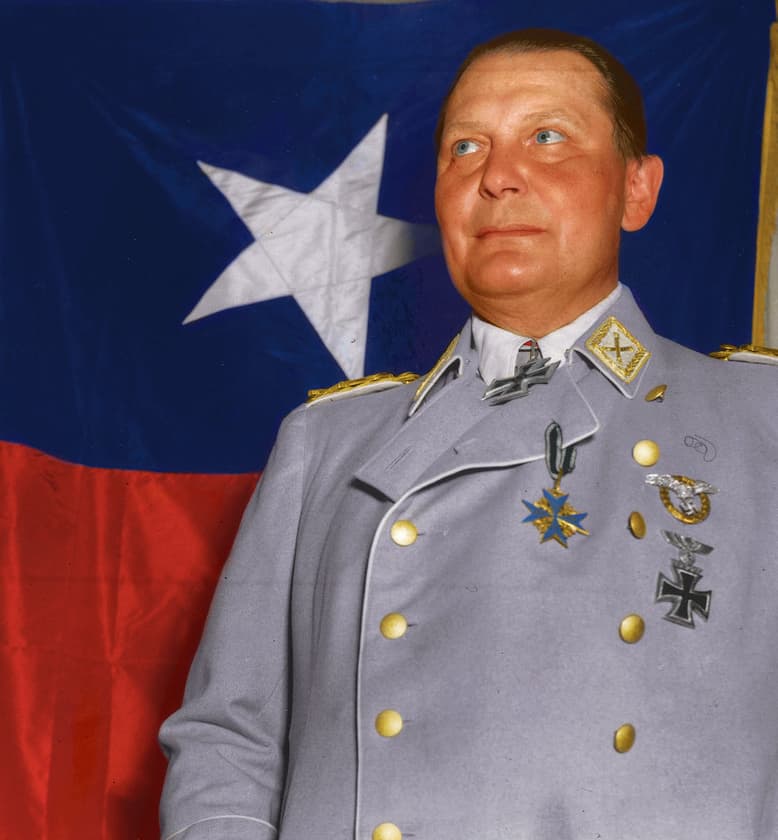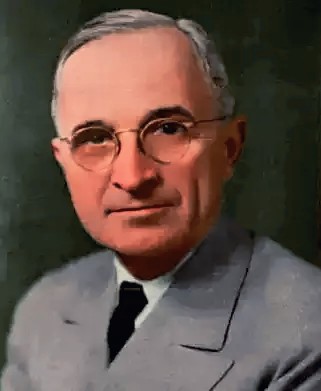Goering gives up to Yanks
Marshal says Hitler sentenced him to die – Kesselring also taken
By Eleanor Packard, United Press staff writer

After surrendering, Reich Marshal Hermann Goering, ex-head of the German Air Force, baffled, donned a fresh uniform with medals and posed for this photograph. (Signal Corps)
WITH U.S. SEVENTH ARMY – Reich Marshal Hermann Goering has surrendered to the Americans.
The former chief of the Nazi Air Force told his captors that he had been in hiding since April 24 when Adolf Hitler condemned him to death for expressing a desire to take over control of the German government.
An announcement today that Goering was in custody of the U.S. Seventh Army also revealed the capture of Marshal Albert Kesselring, former commander of Germany’s Western Front.
Goering was the first of the old guard Nazi triumvirate – Hitler, Goering, Goebbels – to be accounted for officially. He surrendered to the 36th Infantry Division, which was engaged in the Seventh Army mop-up of the surrendered area on the southern wing of what was the Western Front.
Helen Kirkpatrick of The Chicago Daily News and Pittsburgh Press quoted a “most reputable source” in Paris as saying that Heinrich Himmler, head of the Gestapo, is under house arrest in Flensburg, seat of Adm. Doenitz’s German government.
The Danish Kalundborg radio said it learned that Himmler is in Sweden.
Miss Kirkpatrick’s dispatch said Doenitz seized power by a coup d’etat after arresting Himmler.
Reich Marshal Goering – the rank was his alone in the heyday of Nazism – gave up to Brig. Gen. Robert J. Stack, assistant divisional commander, at Radstadt, about 35 miles southeast of Salzburg.
Saved by air force
He told Gen. Stack that Hitler – who was reported by the Nazis to be dead in the ruins of Berlin – sentenced him to death on April 24, when the handwriting was on the wall for even the most nearsighted Nazi to read.
Hitler’s SS Elite Guards arrested him, Goering said. But members of the German Air Force, from the command of which he was ousted in the Nazi debacle, rescued him, he said.
He streaked for a hideout in the Bavarian Alps, the touted “national redoubt” in which the Nazi fanatics were going to hold out after the rest of Hitler’s Reich was gone.
Sends aide
When the 36th Infantry Division approached his hideout, Goering sent his personal adjutant, Col. von Brauchitsch, a son of the commander-in-chief of the German Army in the early days of the war, to divisional headquarters with an offer to surrender to Gen. Dwight D. Eisenhower and Gen. Jacob L. Devers, commander of the 6th Army Group.
Von Brauchitsch arrived at a command post at 9 a.m. yesterday. He explained his mission to Gen. Stack and Maj. Gen. John E. Dahlquist, division commander.
Gen. Stack went with von Brauchitsch to the Radstadt hideout, meeting the Reich Marshal on the road. Goering was accompanied by his wife, a child, and several military aides and personal retainers.
The entire party went to a castle near the famous ski resort of Kitzbuhel, which was occupied by friends of Goering. They arrived at 10:30 p.m. yesterday.
***Give non-Nazi salute
When Gen. Stack and Goering met on the road, both clambered out of their cars and gave the military salute – Goering’s, significantly, not the Nazi salute.
“I am Gen. Stack of the 36th Division,” the officer told Goering.
Goering explained that he spoke some English but understood it better than he spoke it. On the drive to Kitzbuhel, Goering told Gen. Stack that he last spoke to Hitler on April 24.
On that day – one day before the Red Army completed the encirclement of Berlin, where the Nazis said Hitler died in battle – Goering said he telephoned the Fuehrer at Berchtesgaden.
Gives reminder
The Allies were about to bisect Germany, and Goering reminded Hitler that the Fuehrer once said in the early days of the war that if anything happened to him, Goering should assume command.
Goering said he suggested that the time was at hand, since the end seemed near.
Hitler, he said, was enraged by the suggestion. He accused Goering of losing faith and bluntly flung in his teeth the warning that Goering’s death warrant was ready, adding: “If you renounce all your titles and high honors, you will be forgiven.”
Goering said he complied, but Hitler nevertheless ordered his execution. He was arrested at Berchtesgaden, he said. Then his followers shot their way through the Elite Guard and carried him away to a mountain hideout, the location of which the SS men could not ascertain.
Goering seemed in excellent health and high spirits. He gave no evidence of realizing that he was out of the frying pan of Hitler’s sentence into the fire of probable trial by the Allies as a war criminal.
As soon as he arrived at the castle, he bathed and put on a favorite gray uniform trimmed with heavy gold braid. He pinned on a row of the medals for which he has become notorious, and posed for photographers. He asked them to hurry, saying he wanted to eat.
“And drink?” one photographer added.
“Nein, nein,” he retorted. “Drinking is for you.”


